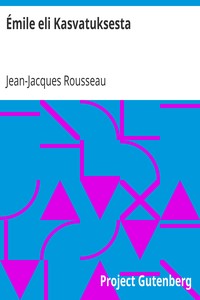Émile eli Kasvatuksesta by Jean-Jacques Rousseau
"Émile eli kasvatuksesta" by Jean-Jacques Rousseau is a philosophical treatise on education written in the late 18th century. The book centers around the fictional character Émile, representing an ideal student through whom Rousseau explores the principles of natural education, arguing against contemporary educational practices. It delves into themes of childhood development, the role of society, and the conflict between natural inclinations and imposed structures. At the start of the text, Rousseau introduces
the concept of writing this work as a collection of thoughts inspired by a well-meaning mother seeking guidance on education. He expresses his intention to challenge prevailing notions about child-rearing and education, highlighting the limitations and deficiencies of existing methods. Rousseau emphasizes the importance of understanding a child's nature and argues that too often, education focuses on preparing individuals for societal roles at the expense of their natural development and well-being. This opening sets the stage for his deep, reflective exploration of how to foster true humanity and individuality in the young. (This is an automatically generated summary.)
Read or download for free
| How to read | Url | Size | |||
|---|---|---|---|---|---|
| Read now! | https://www.gutenberg.org/ebooks/46340.html.images | 1.7 MB | |||
| EPUB3 (E-readers incl. Send-to-Kindle) | https://www.gutenberg.org/ebooks/46340.epub3.images | 725 kB | |||
| EPUB (older E-readers) | https://www.gutenberg.org/ebooks/46340.epub.images | 753 kB | |||
| EPUB (no images, older E-readers) | https://www.gutenberg.org/ebooks/46340.epub.noimages | 740 kB | |||
| Kindle | https://www.gutenberg.org/ebooks/46340.kf8.images | 1.2 MB | |||
| older Kindles | https://www.gutenberg.org/ebooks/46340.kindle.images | 1.1 MB | |||
| Plain Text UTF-8 | https://www.gutenberg.org/ebooks/46340.txt.utf-8 | 1.7 MB | |||
| Download HTML (zip) | https://www.gutenberg.org/cache/epub/46340/pg46340-h.zip | 718 kB | |||
| There may be more files related to this item. | |||||
Similar Books
About this eBook
| Author | Rousseau, Jean-Jacques, 1712-1778 |
|---|---|
| Translator | Hahl, Jalmari, 1869-1929 |
| Title | Émile eli Kasvatuksesta |
| Note | Wikipedia page about this book: https://en.wikipedia.org/wiki/Emile,_or_On_Education Wikipedia page about this book: https://fi.wikipedia.org/wiki/%C3%89mile_eli_kasvatuksesta |
| Credits | Produced by Tapio Riikonen |
| Reading Level | Reading ease score: 37.4 (College-level). Difficult to read. |
| Language | Finnish |
| LoC Class | LB: Education: Theory and practice of education |
| Subject | Education -- Early works to 1800 |
| Category | Text |
| EBook-No. | 46340 |
| Release Date | Jul 20, 2014 |
| Most Recently Updated | Oct 24, 2024 |
| Copyright Status | Public domain in the USA. |
| Downloads | 124 downloads in the last 30 days. |
| Project Gutenberg eBooks are always free! | |

